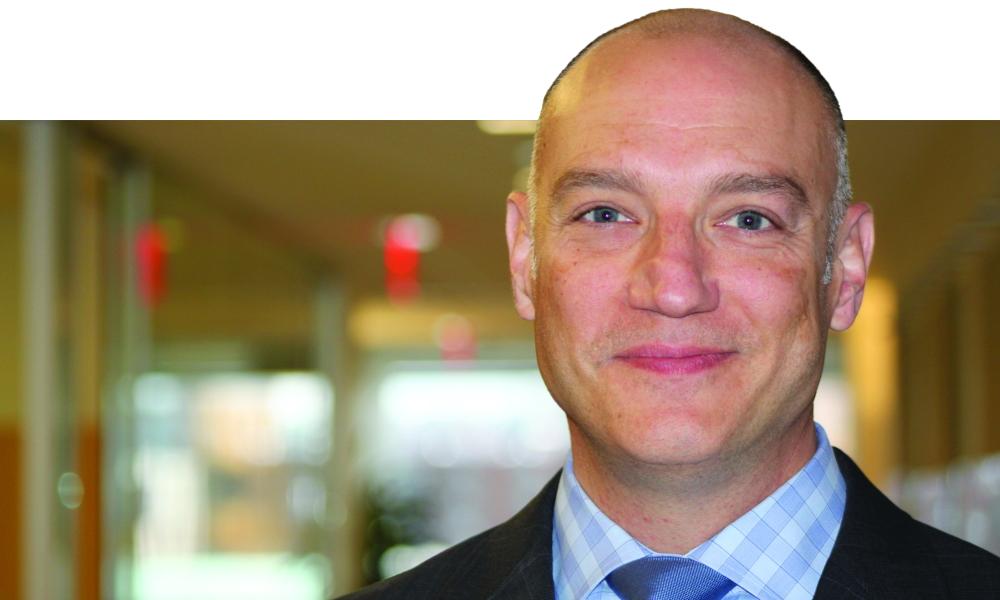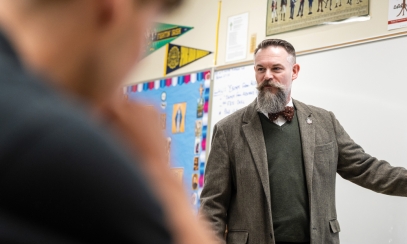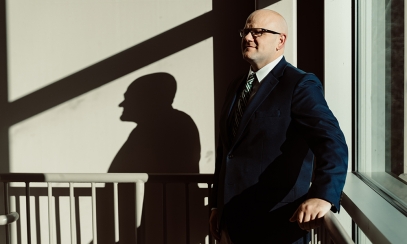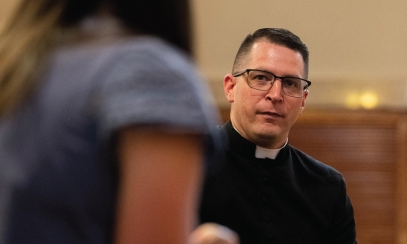
It begins and ends at Notre Dame
Headmaster shares his journey to Spokane’s new Catholic high school
Headmaster shares his journey to Spokane’s new Catholic high school
Dr. Matthew Powell, the first headmaster for a soon-to-open classical Catholic high school in Spokane, is a Notre Dame man from start to finish. A University of Notre Dame alumnus, he will now head the new high school named for Notre Dame – Our Lady.
Hired as the first headmaster of the Chesterton Academy of Notre Dame, to be established initially on the campus of the Cathedral of Our Lady of Lourdes, Powell’s career has taken him through many different educational and nonprofit positions that make him uniquely suited to lead this foray into a different educational market for the diocese.
Notre Dame, South Bend, Ind.
As a freshman at the University of Notre Dame, Powell dreamed of becoming a lawyer, but, after attending a “meet your major” event, his life went in a radically different direction. Speaking with representatives from Notre Dame’s Program of Liberal Studies, he became “fascinated by the idea.” The program started as a "Great Books" program, in imitation of a similar program at the University of Chicago.
“I heard them describe the program: read the original works in their original form and discuss [them] to understand the framework of our culture by reading and learning from the thinkers who created that culture,” Powell said. In many ways, this different method of education was what he had expected from college. “I figured you go away to college and you would read Plato, Aristotle, Chaucer; it was just engaging with the original texts.”
“Seduced by this idea,” he said, “I joined up and was transformed by the Program of Liberal Studies at Notre Dame.”
Liberal Studies and similar programs — whether one calls them great book programs or classical education — exist as a ressourcement type of education. Like the ressourcement movement in Catholic theology leading up to the Second Vatican Council, or even the Renaissance before it, classical styles of education seek a return to original texts to rediscover the foundations of our culture and engage directly with the thought of our forebears.
After graduating from Notre Dame, Powell went on to teach at a Catholic high school in Ohio while earning his teaching certificate. Following a desire to work with Native American teens from a reservation, he moved to Flagstaff, Arizona. There, he taught drama, literature, and history at a public high school. While at the school, he also worked with a program called Upward Bound. “It was a very specific program for kids off the reservation to help get them into college,” Powell said. He worked with students during the school year; while in the summer, the Native American students preparing for college would take a course on the campus of Northern Arizona University through Upward Bound to acclimate themselves to life on campus.
Return to school
Feeling his own educational journey was not complete, Powell began a doctorate in interdisciplinary studies at Marquette University. His research focused on the intersection of theology and literature, specifically, the presentation of spiritual ideas in the works of literature. He taught as an adjunct professor in Ohio, spending five years teaching at Walsh University as a theology professor and working in the honors program.
In 2012, while he was teaching at St. Joseph University in Philadelphia, Powell’s wife passed away. After his wife’s passing, he decided to move with his young son to Washington, D.C., to be near family. Powell started a job in nonprofit support and management. Reflecting on that time of tragic loss and change, Powell remarked, “God puts you on the path constantly to where you need to be.”
During his time in Washington, D.C., Powell’s work allowed him to grow in development, support, and management skills that are essential to running a nonprofit or a school. But after several years, he realized that work in an educational environment was still calling to him.
“I’ve known for a very long time God put me on this earth to be involved with education,” he said. In 2017, he began a new role as president of Bishop McDevitt High School in Philadelphia.
Notre Dame, Spokane
Powell’s journey to Spokane in 2019 seemed to come as something of a surprise and a providential opportunity.
“I heard about the position opening up in Spokane, and this was the job I had always wanted,” he said. “Not only running the school but also the kind of school, a classical education.” At the time of this writing, Powell and his son are embarking on a cross-country trip to Spokane.
At the time of its opening, Notre Dame will be one of more than 20 schools in the Chesterton Network. Powell said he was drawn to the Chesterton Academy Model for reasons beyond its focus on classical education.
“There is no technology in the classroom, and the arts are very heavily focused,” Powell said. “I couldn’t resist the opportunity.” In his past position as a school president, Powell was not able to teach. An aspect of the new Chesterton Academy of Notre Dame is the involvement of the headmaster in teaching. Prioritization of daily contact with the students makes it essential for the headmaster to be in the classroom. The combined role of administration and teaching is not uncommon in many of our Catholic schools, and this change was appealing to Powell. The new position in Spokane “was an opportunity to be back in the classroom,” he said.
The importance of a classical education, Powell emphasized, is the desire to engage with primary texts and learn to think critically. He stressed that to learn to think critically means not just to critique the past, but to engage with influential ideas throughout history so as to be equipped for engagement with the modern world.
“We live in a society that loves to jump to criticism,” Powell said, “but the whole model of the great books and the model that the Chesterton Network is putting out there is to think first before they critique; to learn ideas before they offer opinions about those ideas.”
The Chesterton Academy of Notre Dame aims to open its doors in the fall of 2020. Throughout the 2019–20 academic year, Powell will be working with partners at the diocese, the Cathedral of Our Lady of Lourdes and the Catholic schools in Eastern Washington to prepare for the opening of the new school.
FAQs about the Chesterton Academy of Notre Dame
What is classical education?
Classical education returns to the roots of liberal arts education. Grounded in rhetoric, grammar, and logic, the curriculum and teaching method focus on forming well-rounded, integrated, and joyful students. While engaging critically in the great works of the Western tradition, students learn to participate effectively in the ever-changing modern world. More specifics can be found at chestertonacademyofnotredame.org/about
Is this school meant to compete with Gonzaga Prep?
No. Gonzaga Preparatory is a Catholic and Jesuit high school built to prepare children for college and has been an exemplary educational institution in Spokane since 1877. Notre Dame uses different curricular and pedagogical models than a preparatory school. The school is being formed in response to passionate interest among families looking for a classical high school education in the Catholic tradition. Notre Dame will be entering a local educational market that currently lacks a classical Catholic option.
Why is the diocese supporting this endeavor?
The Diocese of Spokane is responding to the interest of many families who have been hoping for a classical high school in the Spokane area. Bishop Thomas Daly and the diocesan Office of Education are excited to pursue a new and unique option that will augment the educational opportunities provided by the Catholic Church in this market.



